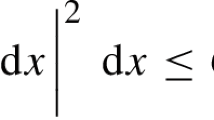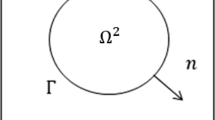Abstract
In this paper, we present and analyze a second order unconditionally convergent mixed finite element method for solving incompressible magnetohydrodynamic problem based on magnetic vector potential. We utilize the second-order backward difference formula within the framework of the mixed finite element method and linearize the nonlinear terms by using the extrapolated technique. The finite element approximation is proposed with the fluid equations are discretized by Taylor–Hood type elements and the magnetic vector potential equation by edge elements. As a result, the divergence-free condition on the magnetic induction preserves exactly on the discrete level. Unconditional error estimates for the velocity and magnetic vector potential are established in the sense that no any restrictions are imposed on the relationship between the time-step size and the spatial size. Finally, several three-dimensional numerical simulations are carried out to illustrate the developed scheme, including convergence tests and some benchmark problems, such as the driven cavity problems and hydromagnetic Kelvin–Helmholtz instability






Similar content being viewed by others
Data Availability
The data in this article are available from the corresponding author upon reasonable request.
References
Balsara, D.S., Kim, J.: A comparison between divergence-cleaning and staggered-mesh formulations for numerical magnetohydrodynamics. Astrophys. J. 602, 1079 (2004)
Balsara, D.S., Spicer, D.S.: A staggered mesh algorithm using high order Godunov fluxes to ensure solenoidal magnetic fields in magnetohydrodynamic simulations. J. Comput. Phys. 149, 270–292 (1999)
Baty, H., Keppens, R., Comte, P.: The two-dimensional magnetohydrodynamic Kelvin–Helmholtz instability: compressibility and large-scale coalescence effects. Phys. Plasmas 10, 4661–4674 (2003)
Ben Salah, N., Soulaimani, A., Habashi, W.G.: A finite element method for magnetohydrodynamics. Comput. Methods Appl. Mech. Engrg. 190, 5867–5892 (2001)
Boffi, D.: Fortin operator and discrete compactness for edge elements. Numer. Math. 87, 229–246 (2000)
Boffi, D., Brezzi, F., Fortin, M.: Mixed finite element methods and applications. Springer Series in Computational Mathematics, Springer, Heidelberg (2013)
Brackbill, J.: Fluid modeling of magnetized plasmas. Space Plasma Simul. 42, 153–167 (1985)
Brackbill, J.U., Barnes, D.C.: The effect of nonzero \(\nabla \cdot { B}\) on the numerical solution of the magnetohydrodynamic equations. J. Comput. Phys. 35, 426–430 (1980)
Brenner, S.C., Scott, L.R.: The mathematical theory of finite element methods. Texts in Applied Mathematics, vol. 15, 3rd edn. Springer, New York (2008)
Brezzi, F., Fortin, M.: Mixed and hybrid finite element methods. Springer Series in Computational Mathematics, vol. 15. Springer-Verlag, New York (1991)
Cai, W., Wu, J., Xin, J.: Divergence-free H(div)-conforming hierarchical bases for magnetohydrodynamics (MHD). Commun. Math. Stat. 1, 19–35 (2013)
Choi, H., Shen, J.: Efficient splitting schemes for magneto-hydrodynamic equations. Sci. China Math. 59, 1495–1510 (2016)
Ciarlet, P.G.: The finite element method for elliptic problems, North-Holland Publishing Co., Amsterdam-New York-Oxford. Stud. Math. Appl. 4, 1–511 (1978)
Costabel, M., Dauge, M.: Singularities of Maxwell’s equations on polyhedral domains, in Analysis, numerics and applications of differential and integral equations (Stuttgart,: vol. 379 of Pitman Res. Notes Math. Ser. Longman, Harlow 1998, 69–76 (1996)
Cyr, E.C., Shadid, J.N., Tuminaro, R.S., Pawlowski, R.P., Chacón, L.: A new approximate block factorization preconditioner for two-dimensional incompressible (reduced) resistive MHD. SIAM J. Sci. Comput. 35, B701–B730 (2013)
Dai, W., Woodward, P.R.: On the divergence-free condition and conservation laws in numerical simulations for supersonic magnetohydrodynamical flows. Astrophys. J. 494, 317–335 (1998)
Davidson, P.A.: An introduction to magnetohydrodynamics Cambridge Texts in Applied Mathematics. Cambridge University Press, Cambridge, UK (2001)
Dedner, A., Kemm, F., Kröner, D., Munz, C.-D., Schnitzer, T., Wesenberg, M.: Hyperbolic divergence cleaning for the MHD equations. J. Comput. Phys. 175, 645–673 (2002)
Ding, Q., Long, X., Mao, S.: Convergence analysis of Crank–Nicolson extrapolated fully discrete scheme for thermally coupled incompressible magnetohydrodynamic system. Appl. Num. Math. 157, 522–543 (2020)
Ding, Q., Long, X., Mao, S.: Error estimate of a fully discrete finite element method for incompressible vector potential magnetohydrodynamic system. J. Sci. Comput. 88, 71 (2021)
Evans, C.R., Hawley, J.F.: Simulation of magnetohydrodynamic flows: a constrained transport model. Astrophys. J. 332, 659 (1988)
Fey, M., Torrilhon, M.: A constrained transport upwind scheme for divergence-free advection, in Hyperbolic problems: theory, numerics, applications, pp. 529–538. Springer, Berlin (2003)
Fu, P., Li, F., Xu, Y.: Globally divergence-free discontinuous Galerkin methods for ideal magnetohydrodynamic equations. J. Sci. Comput. 77, 1621–1659 (2018)
Gao, H., Qiu, W.: A semi-implicit energy conserving finite element method for the dynamical incompressible magnetohydrodynamics equations. Comput. Methods Appl. Mech. Engrg. 346, 982–1001 (2019)
Gerbeau, J.-F., Le Bris, C., Lelièvre, T.: Mathematical methods for the magnetohydrodynamics of liquid metals. Oxford University Press, Oxford, Numerical Mathematics and Scientific Computation (2006)
V. Girault and P.-A. Raviart, Finite element methods for Navier-Stokes equations, vol. 5 of Springer Series in Computational Mathematics, Springer-Verlag, Berlin, 1986. Theory and algorithms
He, Y.: Unconditional convergence of the Euler semi-implicit scheme for the three-dimensional incompressible MHD equations. IMA J. Numer. Anal. 35, 767–801 (2015)
He, Y., Sun, W.: Stability and convergence of the Crank–Nicolson/Adams–Bashforth scheme for the time-dependent Navier–Stokes equations. SIAM J. Numer. Anal. 45, 837–869 (2007)
Heywood, J.G., Rannacher, R.: Finite-element approximation of the nonstationary Navier–Stokes problem. IV. Error analysis for second-order time discretization. SIAM J. Numer. Anal. 27, 353–384 (1990)
Hiptmair, R.: Finite elements in computational electromagnetism. Acta Numer. 11, 237–339 (2002)
Hiptmair, R., Li, L., Mao, S., Zheng, W.: A fully divergence-free finite element method for magnetohydrodynamic equations. Math. Models Methods Appl. Sci. 28, 659–695 (2018)
Houston, P., Schötzau, D., Wei, X.: A mixed DG method for linearized incompressible magnetohydrodynamics. J. Sci. Comput. 40, 281–314 (2009)
Hu, K., Ma, Y., Xu, J.: Stable finite element methods preserving \(\nabla \cdot B=0\) exactly for MHD models. Numer. Math. 135, 371–396 (2017)
Jones, T.W., Gaalaas, J.B., Ryu, D., Frank, A.: The MHD Kelvin-Helmholtz instability. ii. The roles of weak and oblique fields in planar flows. Astrophys. J. 482, 230 (1997)
Li, B., Wang, J., Xu, L.: A convergent linearized Lagrange finite element method for the magneto-hydrodynamic equations in two-dimensional nonsmooth and nonconvex domains. SIAM J. Numer. Anal. 58, 430–459 (2020)
Li, F., Shu, C.-W.: Locally divergence-free discontinuous Galerkin methods for MHD equations. J. Sci. Comput. 22(23), 413–442 (2005)
Li, F., Xu, L., Yakovlev, S.: Central discontinuous Galerkin methods for ideal MHD equations with the exactly divergence-free magnetic field. J. Comput. Phys. 230, 4828–4847 (2011)
Li, L., Zhang, D., Zheng, W.: A constrained transport divergence-free finite element method for incompressible MHD equations. J. Comput. Phys. 428, 109980 (2021)
Li, X., Wang, W., Shen, J.: Stability and error analysis of IMEX SAV schemes for the magneto-hydrodynamic equations. SIAM J. Numer. Anal. 60, 1026–1054 (2022)
Liu, S., Huang, P., He, Y.: An optimal error estimate of the BDF-Galerkin FEM for the incompressible MHD system. J. Math. Anal. Appl. 515(126460), 30 (2022)
Marioni, L., Bay, F., Hachem, E.: Numerical stability analysis and flow simulation of lid-driven cavity subjected to high magnetic field. Phys. Fluids 28, 057102 (2016)
Monk, P.: Finite element methods for Maxwell’s equations. Oxford University Press, New York, Numerical Mathematics and Scientific Computation (2003)
Nédélec, J.-C.: Mixed finite elements in \({ R}^{3}\). Numer. Math. 35, 315–341 (1980)
Ni, M.-J., Munipalli, R., Huang, P., Morley, N.B., Abdou, M.A.: A current density conservative scheme for incompressible MHD flows at a low magnetic Reynolds number. II. On an arbitrary collocated mesh. J. Comput. Phys. 227, 205–228 (2007)
Rong, Y., Hou, Y., Zhang, Y.: Numerical analysis of a second order algorithm for simplified magnetohydrodynamic flows. Adv. Comput. Math. 43, 823–848 (2017)
Rossmanith, J.A.: An unstaggered, high-resolution constrained transport method for magnetohydrodynamic flows. SIAM J. Sci. Comput. 28, 1766–1797 (2006)
Schötzau, D.: Mixed finite element methods for stationary incompressible magneto-hydrodynamics. Numer. Math. 96, 771–800 (2004)
Sermange, M., Temam, R.: Some mathematical questions related to the MHD equations. Comm. Pure Appl. Math. 36, 635–664 (1983)
Shadid, J.N., Pawlowski, R.P., Banks, J.W., Chacón, L., Lin, P.T., Tuminaro, R.S.: Towards a scalable fully-implicit fully-coupled resistive MHD formulation with stabilized FE methods. J. Comput. Phys. 229, 7649–7671 (2010)
Tang, Z., An, R.: Error analysis of the second-order BDF finite element scheme for the thermally coupled incompressible magnetohydrodynamic system. Comput. Math. Appl. 118, 110–119 (2022)
Tóth, G.: The \(\nabla \cdot B=0\) constraint in shock-capturing magnetohydrodynamics codes. J. Comput. Phys. 161, 605–652 (2000)
Wang, C., Wang, J., Xia, Z., Xu, L.: Optimal error estimates of a Crank–Nicolson finite element projection method for magnetohydrodynamic equations. ESAIM Math. Model. Numer. Anal. 56, 767–789 (2022)
Yuksel, G., Ingram, R.: Numerical analysis of a finite element, Crank–Nicolson discretization for MHD flows at small magnetic Reynolds numbers. Int. J. Numer. Anal. Model. 10, 74–98 (2013)
Zhang, G.-D., He, X., Yang, X.: A fully decoupled linearized finite element method with second-order temporal accuracy and unconditional energy stability for incompressible mhd equations. J. Comput. Phys. 448, 110752 (2022)
Zhang, G.-D., Yang, J., Bi, C.: Second order unconditionally convergent and energy stable linearized scheme for MHD equations. Adv. Comput. Math. 44, 505–540 (2018)
Zhang, G.-D., Yang, X.: Efficient and stable schemes for the magnetohydrodynamic potential model. Commun. Comput. Phys. 30, 771–798 (2021)
Zhang, L., Cui, T., Liu, H.: A set of symmetric quadrature rules on triangles and tetrahedra. J. Comput. Math. 27, 89–96 (2009)
Zhang, L.-B.: A parallel algorithm for adaptive local refinement of tetrahedral meshes using bisection. Numer. Math. Theory Methods Appl. 2, 65–89 (2009)
Zhang, Y., Hou, Y., Shan, L.: Numerical analysis of the Crank–Nicolson extrapolation time discrete scheme for magnetohydrodynamics flows. Numer. Methods Partial Differential Equations 31, 2169–2208 (2015)
Zhao, J.: Analysis of finite element approximation for time-dependent Maxwell problems. Math. Comp. 73, 1089–1105 (2004)
Acknowledgements
We gratefully acknowledge the anonymous referees for their pertinent and perceptive comments which have significantly improved our paper. Q. Ding was supported by the Natural Science Foundation of China (12201353), Shandong Province Natural Science Foundation (ZR2021QA054) and the Talent Fund of Beijing Jiaotong University (2023XKRC024), X. Long was supported by the Natural Science Foundation of China (12301499), S. Mao was supported by the National Natural Science Foundation of China (Nos. 12271514, 11871467, 12161141017) and National Key Research and Development Program of China (2023YFC3705701).
Funding
The authors have not disclosed any funding.
Author information
Authors and Affiliations
Corresponding author
Ethics declarations
Conflict of interest
The authors have not disclosed any competing interests.
Additional information
Publisher's Note
Springer Nature remains neutral with regard to jurisdictional claims in published maps and institutional affiliations.
Rights and permissions
Springer Nature or its licensor (e.g. a society or other partner) holds exclusive rights to this article under a publishing agreement with the author(s) or other rightsholder(s); author self-archiving of the accepted manuscript version of this article is solely governed by the terms of such publishing agreement and applicable law.
About this article
Cite this article
Ding, Q., Long, X., Mao, S. et al. Second Order Unconditionally Convergent Fully Discrete Scheme for Incompressible Vector Potential MHD System. J Sci Comput 100, 1 (2024). https://doi.org/10.1007/s10915-024-02553-x
Received:
Revised:
Accepted:
Published:
DOI: https://doi.org/10.1007/s10915-024-02553-x




